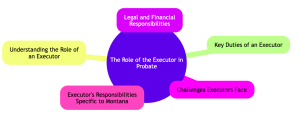
Estate Tax Planning Strategies
May 31, 2024
Family Business Succession Planning
June 2, 2024Introduction to Executors in Probate
Executors in probate have responsibilities that range from managing estate assets to fulfilling complex legal mandates. They are the deceased’s personal representative, honoring final wishes and settling the estate according to the will.
This article from Montana Elder Law outlines the scope of responsibility for estate executors—what to know, consider, and do.
Montana Elder Law is dedicated to serving our communities. We invite you to explore our Elder Law Blog for more resources.
Key Takeaways
- Asset Management: Inventory and appraise all estate assets.
- Debt Settlement: Pay off debts and taxes owed by the estate.
- Tax Handling: File necessary tax returns and handle tax-related issues.
- Asset Distribution: Distribute assets to beneficiaries as dictated by the will.
- Legal Compliance: Comply with all legal and probate requirements.

Understanding the Role of Executors in Probate
An executor, often named in the deceased’s will, is legally appointed to manage the probate process.
The court sanctions their role, giving them the authority to handle the estate’s affairs from start to finish.
- Validating the Will: The executor is responsible for presenting the will to the probate court to prove its validity.
- Managing Estate Assets: This involves safeguarding all assets until they can be properly distributed to the heirs.
- Communicating with Beneficiaries: Keeping all parties informed and involved in the probate process to ensure transparency and trust.
Key Duties of Executors in Probate
Administering the Estate
Executors are tasked with taking control of the deceased’s assets promptly after death.
Taking control involves securing property, accessing safety deposit boxes, and collecting all financial documents.
It’s a role that requires meticulous attention to detail and the ability to act decisively to safeguard the estate’s assets from loss or damage.
Settling Debts and Taxes
Executors must also identify and settle all debts owed by the estate. This duty includes:
- Notifying creditors and the public of the death, often through newspaper announcements.
- Paying outstanding obligations such as personal loans, credit card bills, and medical expenses.
- Filing final personal and estate tax returns and paying taxes from the estate funds.
Distributing Assets
The process of distributing assets involves several steps outlined in the will or, if no will exists, according to state law:
- Locate the Will: Find and verify the last will of the deceased.
- Identify Beneficiaries: Determine who is entitled to the estate’s assets.
- Transfer Assets: Physically and legally transfer property, titles, and funds to the rightful heirs.
- Resolve Disputes: Manage any disputes that arise among beneficiaries fairly and lawfully.
The Role of Executers in Probate:
Legal and Financial Responsibilities
The executor’s legal and financial duties are extensive and require diligent attention to detail to ensure compliance with both the law and the deceased’s wishes.
These responsibilities include filing the will with the probate court, creating an inventory of the estate’s assets, and maintaining estate accounts.
Effectively managing these tasks is crucial to the smooth administration of the estate.
Table 1: Executor’s Legal Obligations
| Task | Description |
| Filing the Will | Submitting the official will to the probate court |
| Inventorying Assets | Documenting all estate assets and their values |
| Managing Estate Accounts | Handling the estate’s financial affairs |
Managing Complex Assets
Handling complex assets such as business interests or multiple real estate properties presents unique challenges. These can include:
- Valuation: Assessing the fair market value of complex assets.
- Management: Overseeing the ongoing operation of businesses or maintenance of properties until they can be properly disposed of.
- Disposition: Transferring ownership or liquidating these assets.
Executors often require professional assistance from attorneys, accountants, and real estate agents to manage these responsibilities effectively.
This teamwork is essential to handle all assets correctly, maximizing the estate’s value for the beneficiaries while minimizing potential liabilities.
Challenges Executors in Probate Face
Executors often face a range of challenges that can complicate the probate process.
One common issue is managing disputes among heirs, which can arise from disagreements over the distribution of assets or the interpretation of the deceased’s wishes. If not handled carefully, these conflicts can delay the probate process and lead to legal battles. (1)
Another challenge is uncovering unknown debts.
Executors are responsible for identifying and settling all estate debts, but unexpected financial obligations can complicate this task.
Avoiding Common Pitfalls
To navigate these challenges effectively:
- Open Communication: Maintain clear and frequent communication with all beneficiaries to manage expectations and reduce misunderstandings.
- Document Everything: Keep detailed records of all decisions and transactions. Documentation can be crucial in resolving disputes or answering questions from beneficiaries or the court.
- Seek Professional Advice: Don’t hesitate to consult with legal or financial experts. Professional advice can be invaluable in complex situations, particularly when unexpected legal or financial issues arise.
- Mediation Services: Consider using professional mediation to resolve disputes among heirs amicably without litigation.
Executor’s Responsibilities Specific to Montana
In Montana, the probate process has some specific nuances that differ from general US procedures.
For instance, Montana does not levy state estate taxes, which simplifies certain financial aspects of estate management but also necessitates understanding how federal taxes will impact the estate.
Table 2: Montana vs. General US Probate Procedures
| Aspect | Montana | General US |
| State Estate Taxes | No state estate taxes | Varies by state, some have estate taxes |
| Probate Process Initiation | File in district court | Generally filed in local probate court |
| Creditor Claim Period | 4 months from notice publication | Typically 4-6 months, varies by state |
Montana Probate Laws
Local laws significantly shape the duties of an executor in Montana.
Without state estate taxes, executors may focus more on federal tax implications and ensuring compliance with Montana’s specific probate filing and creditor notification requirements.
The Role of Executors in Probate: Montana Elder Law
Understanding the full scope of an executor’s duties is necessary for effectively managing and closing an estate.
This knowledge ensures that the probate process adheres to legal requirements and the deceased’s wishes, minimizing potential conflicts and legal issues.
Montana Elder Law is a trusted resource in estate planning and probate services.
Working with a firm with deep local knowledge and a strong track record can provide peace of mind and ensure that the estate is handled professionally and respectfully.
Partnering with a specialist like Montana Elder Law can make all the difference for those going through probate in Montana.
Visit our homepage HERE for more resources!
Reference:
(1) MetLife, Executor of Estate, https://www.metlife.com/stories/legal/executor-of-estate/

